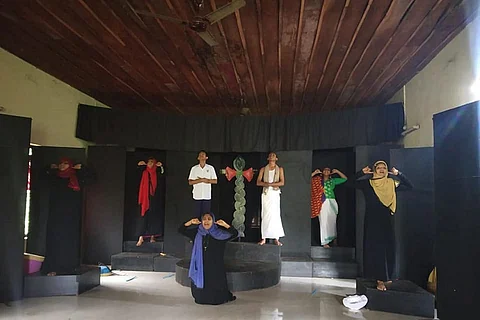

In just a matter of half an hour, four young girls on a stage in Kozhikode ask a bunch of questions, and a few of them appear to have disturbed Muslim organisations such as the Social Democratic Party of India (SDPI) and Muslim Students Federation (MSF). The girls of Memunda Higher Secondary School, Kozhikode, presented a play called Kithab, that won them prizes at the sub-district level. The presentation on Friday was at district level.
Kithab tells the story of a girl who dreams to call out the azaan (Islamic call to worship) like her dad, a muezzin. The SDPI has staged a protest, asking for the play to be withdrawn for hurting religious sentiments, and demanded an apology. The MSF has given a written complaint to the District Education Officer. “While respecting your presentation, the self-respect of a big section of people should also be protected. Have given complaint to DEO and DDE,” MSF leader Anseer Panoli wrote on a Facebook post.
SDPI protest
The Memunda School has a history of presenting versatile themes at school festivals and being recognised for it, says school teacher Sreejith. “For the past 30 years, the school has always come up with unique themes and been noticed for it. Sunil G Vakkom used to direct the dramas presented by the school. For three years now, it has been Rafeeq Mangalsseri. Kithab is about women’s progress, but we do not wish to hurt any religious sentiments and would consider making necessary changes,” he says.
Rafeeq says that the play is an adaptation of writer Unni R’s story ‘Vaang’.
“It’s about gender justice. And it is the day after the play was presented that protests were raised against it,” he says, not wishing to make too many comments at the moment, while they are still deciding their plan of action.
Rafeeq Mangalasseri with the kids in the play
The play is a humorous portrayal of a Muslim household, where the girl who wishes to call out the azaan sings and dances with her friends and mischievously steals the fish fry her mom cooks for the men in the house. She says it is not wrong to steal the fish because padachon (god) would understand that it’s because girls are not given the food they desire that they steal it. Her dad then chastises her, telling her women should get only half of everything men do, and the girl asks mischievously if that is so, shouldn’t women then wear only half of what men do.
It is in between such questions that she expresses her desire to call out the azaan. Her dad answers all her questions by referring to a big book (Kithab) and locks her so she would not perform in a play (play within the play) again. He tells her she wouldn’t reach heaven if she does these things. “If I’d lose entry to heaven because I sing and dance, then I don’t want that heaven,” she says. The dad is ready to kill the girl when she disobeys him and goes to do the school play. But then, the mother reminds him that he is not just the muezzin but also the father of the girl. He then lets her call out the azaan. Kithab ends with the girl calling out the azaan and the rest praying.
The play also takes a dig at the controversy of women's entry at Sabarimala when one girl says, it is a dream of the women of this land to enter 'palli' (mosque) and 'mala' (mountain, referring to Sabarimala).
Watch the full play here: